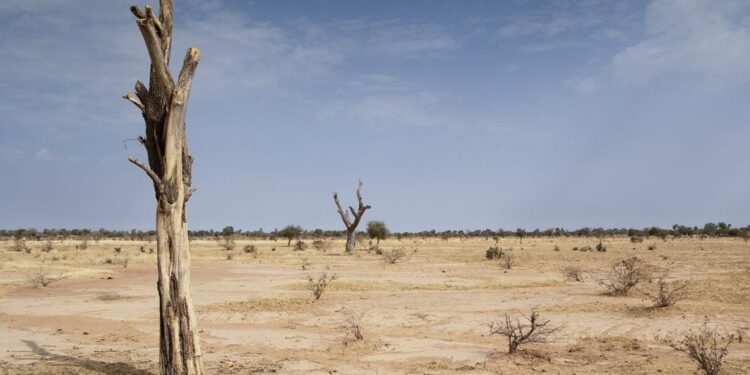The Federal Government has raised alarm over the growing threat of desertification and land degradation, revealing that 43% of Nigeria’s landmass—approximately 923,000 square kilometres—is already affected, endangering the livelihoods of over 40 million people.
Minister of Environment, Mr. Balarabe Lawal, made this known on Friday in Abuja at the National Dialogue themed “Restore the Land: Unlock the Opportunities”. The event was organised by the Centre for Journalism Innovation and Development (CJID), in collaboration with the Federal Ministry of Environment, to mark the 2025 World Desertification and Drought Day (WDD) and Sand and Dust Day.
Represented by the Ministry’s Permanent Secretary, Dr. Mahmud Kambari, Lawal described land degradation as a critical global issue, stressing its devastating impact on food production and human survival.
“Globally, dryland degradation has led to the loss of over 24 billion tonnes of fertile soil, undermining food systems and threatening food security,” he said.
Citing data from the United Nations Convention to Combat Desertification (UNCCD), the minister noted that more than two million hectares of land are lost each year due to desertification, land degradation, and drought. Yet, an estimated 300 million hectares will be needed by 2030 to meet global food demand.
Call for Sustainable Land Management
Lawal highlighted the need for immediate investment in sustainable land management, noting that the 2025 WDD theme aligns with Nigeria’s broader environmental and socio-economic goals.
“Sustainable management of land and natural resources is essential to tackling food insecurity, water scarcity, and the impacts of climate change. Nigeria’s development targets cannot be achieved without environmental protection,” he emphasized.
He added that the government has developed several frameworks—institutions, policies, action plans, and projects—focused on restoring degraded land and addressing desertification and related environmental challenges.
Current Restoration Efforts Inadequate
In her remarks, Mrs. Regina Nwaneri, Director of the Department of Desertification, Land Degradation, and Drought Management, reaffirmed Nigeria’s commitment to the UNCCD but admitted that current restoration efforts remain inadequate.
“Despite the urgency, restoration is not occurring at the required scale. The UN estimates that $1 billion is needed daily from 2025 to 2030 to reverse land degradation, yet current investments fall far short,” she stated.
Still, Nwaneri acknowledged the government’s strides in drought response and ongoing land restoration programs.
Media, Policy, and Community Engagement
Earlier, Mr. Ifeanyi Chukwudi, Senior Project Manager at CJID, highlighted the centre’s efforts to drive policy-focused solutions and community engagement. He noted that CJID has worked closely with ministries and stakeholders to promote evidence-based interventions.
“We’ve trained and mobilised over 500 journalists across Nigeria and the Lake Chad region to amplify land and environmental issues, pushing them into the spotlight for policymaker attention,” Chukwudi said.
He also urged stricter accountability for land users, especially organisations engaged in natural resource extraction without proper permits or compliance with environmental regulations.
The dialogue ended with a call for stronger partnerships between government, civil society, and the media to address desertification and build climate resilience across Nigeria.

Leave a Reply